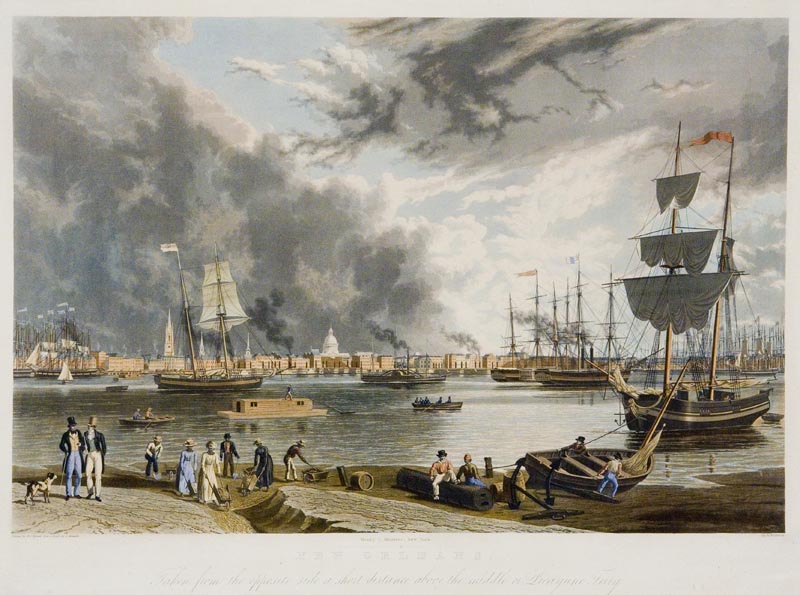May 10, 2021

In 1844 New Orleans was riveted by a dramatic trial: A slave claimed that she was really a free immigrant who had been pressed into bondage as a young girl. In this week's episode of the Futility Closet podcast we'll describe Sally Miller's fight for freedom, which challenged notions of race and social hierarchy in antebellum Louisiana.
We'll also try to pronounce some drug names and puzzle over some cheated tram drivers.
<!--more-->
Intro:
In 1992, a Florida bankruptcy judge held a computer in contempt of court.
The 1908 grave of Vermont atheist George P. Spencer is inscribed with his credo.
Sources for our feature on Sally Miller:
Carol Wilson, The Two Lives of Sally Miller: A Case of Mistaken Racial Identity in Antebellum New Orleans, 2007.
Paul Finkelman, Free Blacks, Slaves, and Slaveowners in Civil and Criminal Courts: The Pamphlet Literature, 2007.
Gwendoline Alphonso, "Public & Private Order: Law, Race, Morality, and the Antebellum Courts of Louisiana, 1830-1860," Journal of Southern Legal History 23 (2015), 117-160.
Emily West, "The Two Lives of Sally Miller," Slavery & Abolition 30:1 (March 2009), 151-152.
Carol Lazzaro-Weis, "The Two Lives of Sally Miller: A Case of Mistaken Racial Identity in Antebellum New Orleans," Journal of Southern History 74:4 (November 2008), 970-971.
Frank Towers, "The Two Lives of Sally Miller: A Case of Mistaken Identity in Antebellum New Orleans," American Historical Review 113:1 (February 2008), 181-182.
Scott Hancock, "The Two Lives of Sally Miller: A Case of Mistaken Racial Identity in Antebellum New Orleans," Journal of American History 94:3 (December 2007), 931-932.
Daneen Wardrop, "Ellen Craft and the Case of Salomé Muller in Running a Thousand Miles for Freedom," Women's Studies 33:7 (2004), 961-984.
Patricia Herminghouse, "The German Secrets of New Orleans," German Studies Review 27:1 (February 2004), 1-16.
Marouf Hasian Jr., "Performative Law and the Maintenance of Interracial Social Boundaries: Assuaging Antebellum Fears of 'White Slavery' and the Case of Sally Miller/Salome Müller," Text & Performance Quarterly 23:1 (January 2003), 55-86.
Ariela Gross, "Beyond Black and White: Cultural Approaches to Race and Slavery," Columbia Law Review 101:3 (April 2001), 640-690.
Stephan Talty, "Spooked: The White Slave Narratives," Transition 85 (2000), 48-75.
Carol Wilson, "Sally Muller, the White Slave," Louisiana History: The Journal of the Louisiana Historical Association 40:2 (Spring 1999), 133-153.
Ariela J. Gross, "Litigating Whiteness: Trials of Racial Determination in the Nineteenth-Century South," Yale Law Journal 108:1 (October 1998), 109-188.
Carol Wilson and Calvin D. Wilson, "White Slavery: An American Paradox," Slavery & Abolition: A Journal of Slave and Post-Slave Studies 19:1 (1998).
Wilbert E. Moore, "Slave Law and the Social Structure," Journal of Negro History 26:2 (April 1941), 171-202.
"Case of Salome Müller," Law Reporter 8:7 (November 1845), 332-333.
Nina C. Ayoub, "'The Two Lives of Sally Miller: A Case of Mistaken Racial Identity in Antebellum New Orleans,'" Chronicle of Higher Education, Oct. 19, 2007.
Carol Edwards, "Story of German Slave Girl 'Extraordinary,' But Is It True?", [Charleston, S.C.] Post and Courier, March 20, 2005.
Mary-Liz Shaw, "'The Lost German Slave Girl' Unravels a Mystery of Old South," Knight Ridder Tribune News Service, Jan. 26, 2005.
Gregory M. Lamb, "The Peculiar Color of Racial Justice," Christian Science Monitor, Jan. 25, 2005.
Linda Wolfe, "Sally Miller's Struggle to Escape Slavery Ended in Celebrated Case," Pittsburgh Post-Gazette, Jan. 23, 2005.
Debra J. Dickerson, "Making a Case for Freedom: Was a White German Girl Forced Into Slavery?" Boston Globe, Jan. 23, 2005.
Jonathan Yardley, "The Case of Sally Miller," Washington Post, Jan. 20, 2005.
"Strange Case in New Orleans," Alexandria Gazette, July 3, 1845.
"City Affairs," New-York Daily Tribune, July 11, 1844.
Madison Cloud, Improvising Structures of Power and Race: The Sally Miller Story and New Orleans, dissertation, Baylor University, 2015.
Carol Wilson, "Miller, Sally," American National Biography, April 2008.
Listener mail:
David Lazarus, "Wonder Where Generic Drug Names Come From? Two Women in Chicago, That's Where," Los Angeles Times, July 23, 2019.
"Naming Law in Sweden," Wikipedia (accessed April 30, 2021).
"Baby Named Metallica Rocks Sweden," BBC News, April 4, 2007.
Meredith MacLeod, "Sweden Rejects 'Ford' as Name for Canadian-Swedish Couple's Son," CTVNews, Nov. 9, 2018.
"Naming Law," Wikipedia (accessed April 30, 2021).
"Naming in the United States," Wikipedia (accessed April 30, 2021).
Tovin Lapan, "California Birth Certificates and Accents: O'Connor Alright, Ramón and José Is Not," Guardian, April 11, 2015.
"AB-82 Vital records: diacritical marks" (as amended), California Legislative Information, Sept. 15, 2017.
This week's lateral thinking puzzle was contributed by listener Charlotte Greener. Here's a corroborating link (warning -- this spoils the puzzle).
You can listen using the player above, download this episode directly, or subscribe on Google Podcasts, on Apple Podcasts, or via the RSS feed at https://futilitycloset.libsyn.com/rss.
Please consider becoming a patron of Futility Closet -- you can choose the amount you want to pledge, and we've set up some rewards to help thank you for your support. You can also make a one-time donation on the Support Us page of the Futility Closet website.
Many thanks to Doug Ross for the music in this episode.
If you have any questions or comments you can reach us at podcast@futilitycloset.com. Thanks for listening!



